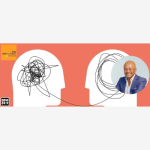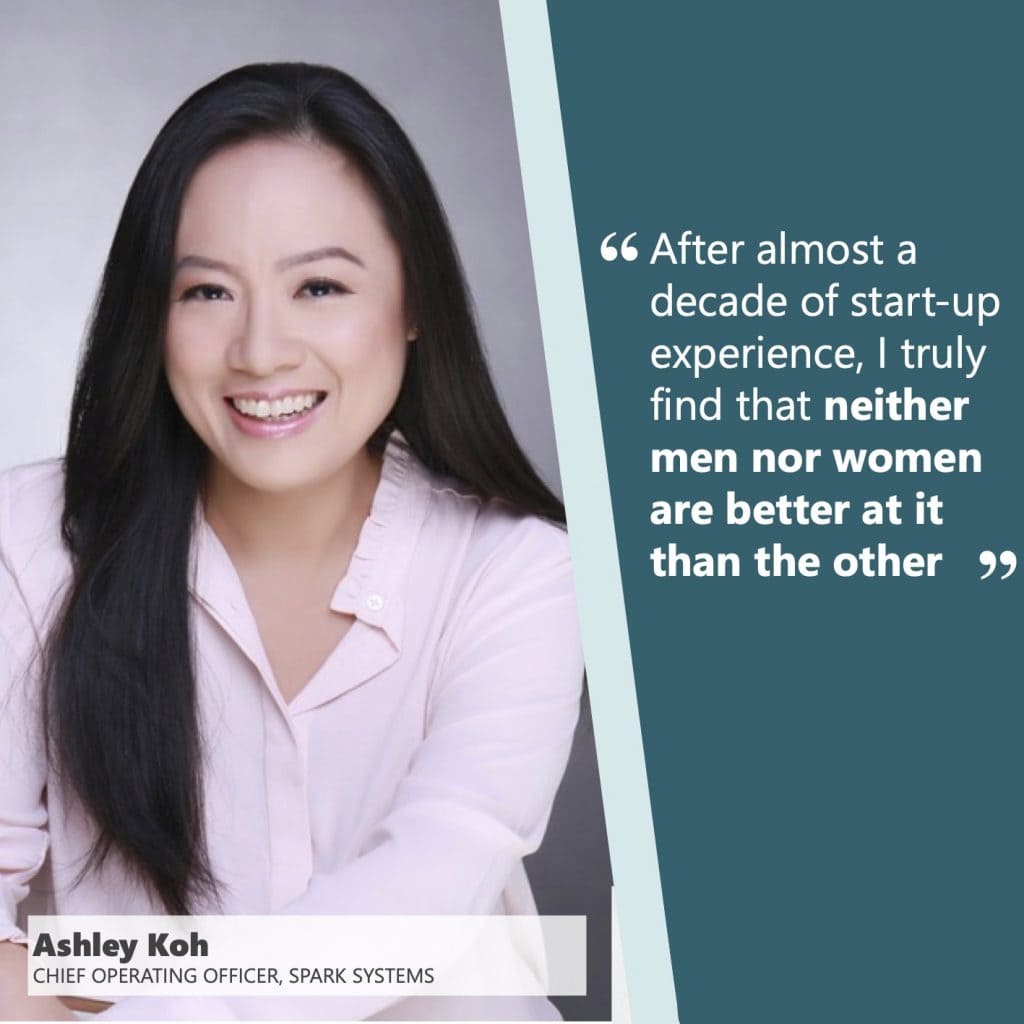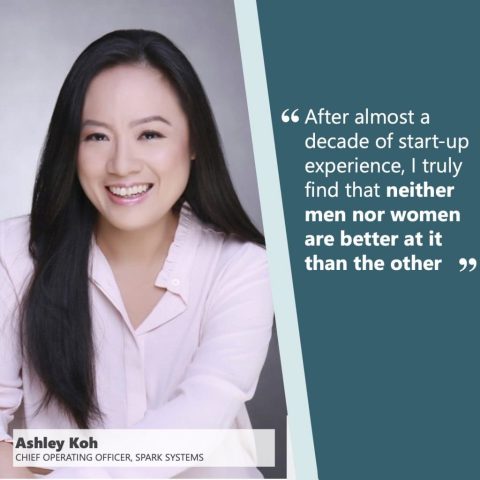
Naluri: Health is wealth on the biztech.asia health and wellness show
4 August, 2021
Naluri: On the Morning Run, The Breakfast Grille
17 August, 2021
Ashley Koh on #WinWithWomen – the importance of mentorship and connection
11 August, 2021
On this week’s #WinWithWomen, we chat with Ashley Koh who is the Chief Operating Officer at Spark Systems, the first high technology solution provider for institutional forex trading originating from Asia. Ashley is also an active mentor in the FinTech and startup scene in Singapore. Ashley shares her thoughts on the importance of mentorship and why she believes that the supreme goal for humanity is connection.
Hi Ashley, could you share your career background with us?
My first job was as a business analyst in one of the first online trading brokerages during what you would call the Web 1.0 era, that saw the likes of pets.com, toys.com etc. From being a business analyst on the technology side, I moved on to be a product manager at investment banks to create the first version of their online institutional trading platforms. I continued to stay on the product management path up till joining my first startup. Everyone wears multiple hats in startups, hence besides building and launching products, I had to quickly learn how to operate every aspect of the business around the services post-launch, which saw me evolve into a Chief Operating Officer role from thereon in subsequent startups.
You spent several years in large corporations before you moved to a startup. What made you take the leap of faith and were there challenges you faced during this transition?
I joined startups before the term “FinTech” was coined, so there was no pressure to join the latest trend then. Rather, I was on maternity leave getting ready to go back to the corporate world when my ex-manager reached out serendipitously about joining his recently founded company. His courage and exuberance for his audacious business idea was definitely infectious. But more importantly, his acknowledgement and unwavering support in helping me transition to become a working mother was what made me take the leap of faith.
A challenge I faced during the transition was learning how to manage the delicate balance of adopting a macro versus micro focus, knowing when to zoom out high and wide and when to zoom in closely and focusing on the details when the circumstances call for it. The ability to see the forest versus the tree is something very important when managing a fast-moving and evolving organization. As I am innately a micro and detail-oriented person, I have to fight against my nature and learn when to switch between perspectives when the circumstances call for it. Another challenge is deciding which fires to let burn and how long to let them burn for. Startups can be chaotic with constant shifts in the underlying technology, the competition, the market, and the people. If you spend all your time fighting fires, you may miss critical opportunities to build your business and become reactive instead or proactive. Yet if you let fires go on too long, you will get burnt. It’s a skill that needs to be honed every single day.
Could you tell us a little about Spark Systems and what you love most about your work?
Spark Systems is a foreign exchange (FX) trading platform built by traders in Asia, for Asia. We bring regional traders an aggregated low-latency access to fragmented worldwide FX liquidity, that executes faster and smarter with minimal information leakage, reducing overall transaction costs for our clients. This is accompanied by a suite of pre and post trade data analytics to help our clients uncover hidden market opportunities.
After almost a decade of startup experience, I truly find that neither men nor women are better at it than the other. It is a young sector with so much continuous development that both men and women who love creating new things and seeking progress will find lots of exciting discoveries and learnings in their professional life. To create something from scratch and launch it to the world is indeed a feeling like no other.
___________
“After almost a decade of startup experience, I truly find that neither men nor women are better at it than the other.”
___________
Apart from your role at Spark, you are also an active mentor in the FinTech and startup communities. How did you first get involved in mentorship and why is it important to you?
I chanced upon the topic more formally when I attended my first LeanIn event as a panellist over 3 years ago. There were many questions raised about how to get started on mentoring and more importantly, how to extract real value out of it. The network grew from there as people look for support from one another to overcome challenges like incompatible matching, lack of mentor/mentee training and unaligned expectations etc.
Mentorship is important to me as startups are very much about building teams. The tenacious teammates I have worked alongside to build products, launch, fix and launch again, have taught me that true leadership is displayed in recognising, appreciating and harnessing each individual’s unique strengths to help them do something great, in their own way. There is nothing more satisfying and energising to me than witnessing the impact when a person’s potential is unleashed.
Could you share your views on how both the mentor and the mentee can extract value from a mentorship?
For all experienced women mentors who have battled their way up the corporate and entrepreneurial ladder, have the courage to walk through that doorway of opportunity and not let it slam shut. Mentor our young women so they can fast track their development by learning from your life experiences and seeing from more perspectives than their own. True leadership is to recognise, appreciate and harness each individual’s unique strengths to help them do something great, in their own way.
For young women who have already taken the leap of faith and are fortunate to have found a mentor in their managers or colleagues, understand that mentorship is a development-driven rather than a performance-driven process, as no one other than yourself can guarantee your performance. Mentorship is not a silver bullet that cures all. It requires a lot of input, not just from the mentor, but the mentee as well. The mentee must first know what they want from the experience, otherwise they will never know if they have even attained it. Like with anything in life, you cannot expect great outputs from poor inputs. The essence is that once you learn how to walk, you set your own path.
___________
“Like with anything in life, you cannot expect great outputs from poor inputs. The essence is that once you learn how to walk, you set your own path.”
___________
For young women who are just starting their careers, how can they go about finding a mentor and building a relationship with that mentor?
Throughout my corporate career, I have had both formal and informal mentors. The formal corporate mentorship programs were “chosen” and “matched” based on our profiles. In my experience, the relationships were somewhat more cordial, formal and restrictive. I have gained more from informal mentorship where I am able to identify certain people whom I am aligned with on their operating principles. I develop a relationship with them organically and communicate honestly, clearly and thoroughly on my challenges and goals. This builds trust and respect which is important for a great mentor-mentee relationship which is a two-way street. My mentor who played a critical role in my career showed me the path where I was able to push myself the hardest to go out of my comfort zone and explore new possibilities for myself, gaining confidence and a greater appreciation of who I can become.
Could you share your experience as a female leader in a technology company? What advice would you have for women aspiring for leadership roles?
I wish courage for everyone in this journey towards equality for all in leadership positions. Find the courage by taking the first step, one way or another. Recognise that mistakes are a natural part of the evolutionary process, and not a notch down some imaginary badge of honour. Resistance to failures paralyses the way forward. However, when we consciously stop judging ourselves so harshly, we can build up courage and start discovering, one step at a time.
However, I recognise that it is easy to express, but hard to act on. Like many important things in life, it is a decision you have to make. You have to look within yourself and want to do it, regardless of the outcome. Courage can be built by taking on more “learn by doing” opportunities and through continual practice – don’t wait for them to be handed to you. However, to do anything exceptionally well, you always have to push your limits and often times this would mean crashing and getting hurt. Recognise that this is not failure, unless you give up. Going through struggles can help you discover your strength and we have to be open to embrace the lessons taught. The lesson one should take from the idea of “fail fast, fail often” is to be iterative in your approach. With the courage to take the first step and the learnings from it, comes the discipline to take the next one. Like many things in life, it is simple to understand but not easy to do. In true startup spirit, we can try, fail and try again, but we should not fail to try.
How does the company you work for support gender balance?
We support gender balance firstly, by not having a biased lens and secondly, by creating an open-minded culture where we appreciate team members based solely on their talent and performance, not because someone looks or acts like us. We then strive for a balanced gender representation on the leadership team as we believe it has a trickle-down effect on the rest of the teams. These positive effects include access to new talent pools, broader collections of experience, viewpoints and backgrounds which result in better decision making, innovation and efficiency. With fair representation and compensation practices in place, this further leads to better employee engagement, talent attraction and retention which all leads to a better bottom line. Last but not least, these positive outcomes further enable us to differentiate ourselves from our peers in a competitive environment.
What do you think can be done to encourage greater gender balance in technology companies?
I think before anything, we have to frame the gender equality conversation in the right context. First, real and sustainable progress needs to be made. Equality is not the end goal here, the supreme goal for humanity is connection. People can be equal but still isolated. However, when humanity is truly connected, each individual’s strengths, regardless of their gender, can be realised and harnessed more effectively than ever before. Equality is treating everyone the same, equity is giving everyone what they need to be successful. The more connected we all are, the more naturally sustainable the gender parity equilibrium will be for a long time to come, as compared to any “forced” maxim which can lose momentum. Recognising diversity and fostering inclusion is not only good for societies, but good for business. The female economy is expected to yield $12 trillion in incremental global GDP by 2025. Let us all focus on growing the pie, not dividing it. For many, it is ingrained that for one to win, another has to lose. Pie-splitting is attractive because it is familiar and deemed easier. Pie-growing is foreign because it takes more courage as it is uncertain and messier. We must find a mutually beneficial way of working together, by connecting, exploring and celebrating the unique strengths of all, as we build technology ecosystems together, better.
___________
“Equality is not the end goal here, the supreme goal for humanity is connection. People can be equal but still isolated.”
___________
Is there something that inspires you?
I get a lot of inspiration from books – from entrepreneurial reads and philosophical studies, to biographies. One lifetime is not enough for me to go through the vast spectrum of life experiences out there and books are a great way to accelerate my learning through the failures and successes of others. My all-time favourite books are “The Hard Thing About Hard Things” by Ben Horowitz and “Principles” by Ray Dalio.
Lastly, is there anything else you would like to share?
For anyone contemplating venturing into a new world of doing things, find your purpose and understand your strengths so you can draw on them in ever-changing technology-related industries. Understand that while life can only be understood backwards, it must be lived forward, bravely.

